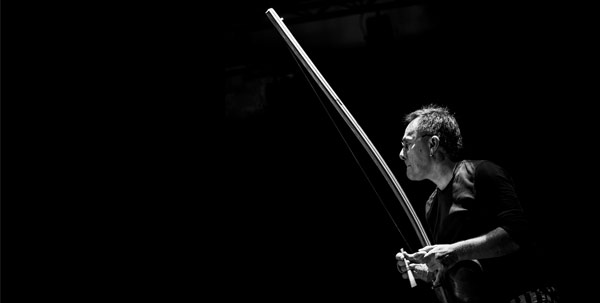

Ruca Rebordão
An album by a percussionist - won’t it be all about rhythms and banging stuff rather than songs and melody? Well, not this one. Rebordão’s wide range of percussion is more about pitch and contrasting textures than thud, and this is a varied and very attractive set of songs and instrumentals, the majority his own, with finely wrought arrangements featuring guest vocalists and instrumentalists with most of whom he’s played over the years. The opener, "Berimbando,” has an African-Brazilian traditional feel, and features some of the many percussion instruments he commands - berimbau, pandeiro, caxixi, surdo, cajón and pandeiros - with his singing and a gruff recitative from Lisbon-resident Guinea-Bissauan Biru. "Minha Terra” is a song with a warm Brazilian-style swing over pattering percussion, written by Portugal’s Luiz Caracol and José Falho Gouveia, with Caracol, with whom Rebordão often plays, on soft vocals, guitars and bass, with Ciro Bertini’s flute and Rebordão’s tambourine, udu, adufe and more.
"Estórias da Floresta,” by Brazilians Milton Nascimento and Fernando Brant, preluded by sounds of the forest and birds, and accompanied just by percussion including udu, congas, talking drum, African drum and triangle, has pacey vocals by Luanda Cozetti of the Portugal-resident Brazilian duo Couple Coffee. In the tropical instrumental dance "Sete Amigos” the titular seven friends include Nanã Sousa Dias soloing on soprano sax, António Pinto’s electric, acoustic and synth guitars and bandolim, Bertini on piano and guitar, drummer Ivo Costa, and on bass the other half of Couple Coffee, Norton Daiello. The multi-instrumentalist Ciro Bertini, who co-produced the album with Rebordão, takes the vocal, and chants and washes of backing vocals, on his own composition "Amolador,” and plays piano, guitar, bass and multitracked flutes.
Rebordão and partner Marta Coutinho’s "Quem Tem Mar” is sung urgently and passionately by Paulo de Carvalho. He was Portugal's Eurovision entry back in 1974 but is more recently well known for his many records combining pop approaches with fado and other Iberian traditions.
Rão Kyao’s soaring bansuri flute opens "Vale Santiago,” preceding a burst of bol (tabla vocalisation) from Rebordão that leads into an Andean sounding 3/4 intrumental, opening out into a floating improvised section before returning to the bol vocal and the 3/4. "São Paulo Madrugada,” written by Brazilians Webster Santos and Marcus Oliveira, is a slinky, cool-jazzy instrumental tune led by Guto Lucena’s tenor sax with Chris Wells on piano, Fender Rhodes, bass and a variety of Latin-American percussion, particularly distinctively the grunt and squeak of the friction-drum cuica, with Rebordão’s congas, caxixi and udu.
There are four Rebordão solo tracks. In his Angolan-sounding "O Dundo” he sings and plays kalimba, talking drum, berimbau (a key instrument in Angola as well as in Brazil) and deep African drum. In the Brazilian-style "Na Roda Do B” he accompanies his scatting vocal on shuffling berimbau, synths, tabla, kalimba, bass, shakers and programmed drums. The tune in the instrumental "Afro Maine” is played on multi-tracked kalimbas, with shakers, pandeiro and the deep boom of djembe and electronic surdo. The album closer, "Ya Tilou” has just his layered vocals, triggering echo/reverb effects.
Search RootsWorld
|